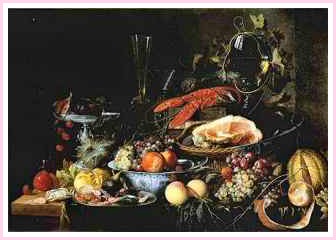Wierd Facts About The
History Of Food
Here are 10 wierd facts about the history of western food.
Amazing ...but true...
This is the relationship the wealthy had with eating - it was a mark of status and dinners were socially competitive. For the rest of the people, in fact, the majority, eating was boring. It was for survival, not for pleasure.
Wierd!
1. Food was a mark of wealth - Feasts were commissioned for painting
Eating for the majority - well, that was simple - the options were pottage ( a thick grain porridge), bread, cheese and onions washed down with beer. Yep, it was the same boring food for most.
For the rich..., well, this was another story altogether! There were feasts of roasted meats, pies, puddings, cakes and painters were employed to paint feasts.
Heem Boijmans Still Life
Wierd Facts!!
2. The smell of cooking was considered low class
Don't you just love coming home to the aroma of freshly baked cakes or the yummy smell of a roast in the oven? We even plan our homes these days for the kitchen to be the center of family life, with cooking and meals integral to our busy activities.
Not so, for rich folks in Edwardian times.
British
country mansions were designed so that the kitchens were as far away as
possible from the family dining room and the formal reception and
dining rooms. It seems the upper class, while they enjoyed delicacies and treats,
they regarded the smell of cooking to be terribly low class and
they even furnished their dining halls with little or no fabric, no
tapestries, nothing that would trap the smell of food.While other rooms
were richly decorated with carpets and tapestries, not to their dining
halls.
They even had incense burners in the dining halls to overpower any smell that might come from the meals!
How times change...or perhaps, the majority of people are now just low class.
Wierd Facts
3. The 17th Century Blog
The reason we know so much about life in the 1600's is because a man, Samuel Pepys kept detailed diaries and he did this daily for 10 years. He wrote about everything to the smallest detail including recipes and eating habits of the rich and the poor.
How about these as wierd facts?
4. Even in the 1600's there were Celebrity Chefs!
While the majority had
to make do with pottage and with luck some vegetables or meat thrown in
the pot, the uber-rich imported French chefs to cook for them in their
country mansions.
It seems the trend for Continental chefs arose because of the French and Spanish queens, marrying into British Royalty. They would have brought with them their own chefs and introduced spices and exotic dishes to English menus.
Wierd Facts
5. At a dinner party, 50 pieces of silver, crockery and glass would be used by EACH guest
Dinner parties were so very important to the social reputation of Edwardian families that they would pay 10 times the salary of a butler to secure a male chef from Europe to cook only the finest meals for the family and their guests.
The chef was a status symbol and it was hoped the exotic feasts would be the draw card to entice guests to their parties. At the dinners would be served French luxuries as truffles, oysters, game, patisseries, fine chocolates and champagne. There would be eight courses at dinner, which meant that each guest would be using 50 pieces of silver, crockery and glassware. For 20 guests, that would be 1000 pieces would be required to be handled and moved between the kitchen and the dining hall.
All the silver was locked away, so you can only imagine the procedures for checking in and checking out of each item.
6. There were strict rules of etiquette at the table.
Etiquette: Rules & Usages of the Best Society, Anon, 1886
- Never allow a servant to fill your glass with wine that you do not wish to drink. You can check him by touching the rim of your glass.
- Bread is broken at dinner.
- Never use a napkin in place of a handkerchief for
wiping the forehead, face or nose.
- Everything that can be cut without using a knife should
be eaten with the fork alone.
- Never lay your hand, or play with your fingers upon the table.
- Do not toy with your knife, fork or spoon, make crumbs of your bread, or draw imaginary lines upon the tablecloth.
- It is not in good taste to urge guests to eat, nor to load their plates against their inclination.
Life may have been easy for the rich, but somehow I think the social demands would have been stressful.
Wierd Facts
7. A dog was specially bred to turn roasts
Truly!
Only rich people could afford meat, let alone roasts. Besides the cast of dozens of servants in the kitchen, there was also a little dog.

The Vernepator Cur or Turnspit dog was bred to run inside a wheel that turned a spit roast so that it would cook evenly. This took both courage (to stand near the fire) and loyalty (not to eat the roast). Due to the strenuous nature of the work, a pair of dogs would often be worked in shifts. This may have led to the proverb "every dog has his day".
It was the role of the turnspit dog to make work easy in the kitchen, releasing possibly a slave to more productive work like peeling potatoes or onions.
These little dogs became extinct in the 19th Century as kitchens modernized and roasts were no longer cooked in open fireplaces.
Now, as for the majority...
This was what it was like for the everyday person.
8. Children drank beer
People including children drank beer in the 17th Century and water was considered unhygienic. When the colonists settled in the Americas beer had to be imported and so they resorted to drinking water. They were amazed that their children thrived despite having to drink water.
9. Milk was not a beverage
Milk in those days was used to make butter and cheese. No one drank milk as a beverage as they do nowadays.
Wierd!
10. Colonists couldn't fish when they first arrived
It seems that despite the plentiful supply of fish, Colonists couldn't have fish as part of their diet because they brought the wrong sized fish hooks! They had to wait for the next shipment of goods from England and Holland for the right sized hooks.
|
|
|








Comments